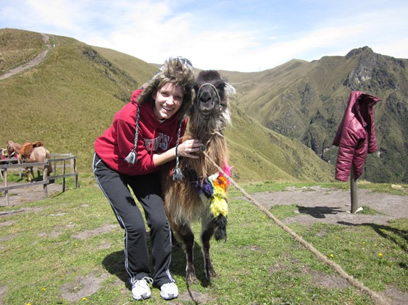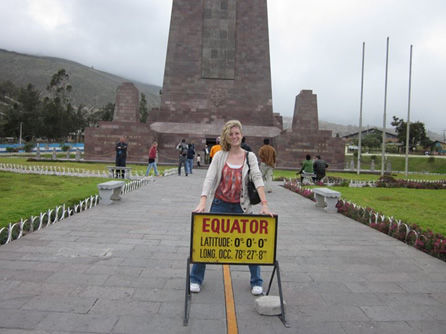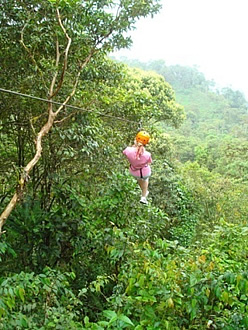How to Live and Study Abroad in Ecuador
Training to Teach in Tumbaco
Article and photos by Kristie Kannaley

|
|
Hanging out with a Llama in Ecuador.
|
Near the end of my junior year of college, as I trudged through endless (and honestly, mildly repetitive) education classes, I questioned my desire to become a teacher. Fearing that I had lost something that I had felt so confident about since 9th grade, I decided to go ahead and finish the degree, following it wherever it led me. I chose to leave the United States because I thought it would be less daunting and repetitive than spending a final semester in Georgia. I wanted to go to graduate school for linguistics — and maybe Teaching English as a Second Language — if I could get over the slump of being frustrated with my major.
In my case, it was most important to prepare mentally for the trip, which is a factor that some people tend to forget when they are caught up in the endless paperwork of visas and passports (more on those later). At that point in my life, I had not been more than a few hours away from home for more than a week at a time. Even though I was sure I wanted to go to Ecuador and have an experience that would help me grow into an independent young adult, I felt insecure. I did not know if I could do it. While I knew I would be traveling to a safe area, spending my first international experience in what some consider a developing country made me feel a little queasy.
Mental and Emotional Preparation
There are several practical ways to mentally and emotionally prepare yourself for a trip abroad:
-
Have conversations with people you respect and those who have visited the country you visit. I spoke with professors about my uncertainties and overall reservations. I attended meetings at my university about the student teaching trip and listened to alumni talk about the country. I got into a relationship with someone who had traveled to Ecuador. Conversations with him were beneficial because I could ask questions and gather opinions from people in my comfort zone. Do you not know anyone who has actually been to the country? Try online message boards!
-
Educate yourself. This overlaps with #1, but if you are like me, you need something more than reassurance. I needed facts and statistics. I used travel.state.gov to see if there were any alerts about traveling to Ecuador. The website also offers statistics, including crime rates and other important notes for traveling Americans.
-
Anticipate culture shock. I thought culture shock was a myth, but as I went through every single stage during my semester in Ecuador. When I returned to the United States, I became a believer in the phenomenon.
Putting Together the Paperwork
The biggest mistake that some of my colleagues made was that they waited too long to acquire the necessary documentation. Government documents take time. Suppose you are studying/teaching/researching abroad for over a few weeks. In that case, you will need a minimum of two forms of government paperwork: a passport and a visa.
Passports
Acquiring a passport is relatively easy, but processing could take over a month. The State Department website provides the information you need to apply for your passport. The paperwork is also in PDF format, so you can fill some out before leaving the house, saving you some time. Also, check out the website of your local post office. Many offices will allow you to schedule a time to apply for your passport. Don't be afraid to call and ask questions; one of the most frustrating parts of using these documents is being unsure which identification paperwork you need. You don't want to have to reschedule an appointment because you forgot something.
Visas
Visas are trickier because you must ensure you apply for the right one. Even though I went abroad as a student, I was told by my institution that I needed to acquire a "Cultural Exchange" visa rather than a student visa. If you are traveling within a program associated with your institution, ask the faculty members involved about the type of visa you should apply for. The type of visa can change based on your intended reasons for travel and the amount of time you will spend in your chosen destination country. Travel.state.gov: U.S. Students Abroad offers more information about the different types of visas available as well as advice for students.
Financial Matters
Before I looked into traveling to Ecuador, I had always thought that studying abroad would not be possible for me due to a lack of finances. However, once I inquired about the options associated with my institution, I discovered that studying abroad would be cheaper than staying in the United States for the same period due to the scholarship money I could apply for.
Some of the opportunities offered to students in the United States include:
Personal
Spend at least 30 minutes sitting in your apartment/house/wherever you live and think about what you do regularly outside of your home that you would not be able to do if you were locked inside for a month. I am serious. You need to take care of many things before you leave unless you are positive you can do so from the country to which you are traveling. This includes:
-
Medications. (You need to go to the doctor EARLY to get these because some pharmacies can be a hassle when you try to get several months of prescriptions at a time).
-
Bills. If you don't pay them electronically, you must ensure reoccurring payments, such as car loans, are taken care of before leaving. These things take some work to handle internationally.
-
Bank. Your bank needs to know that you are leaving the country. I spoke to a teller who initially told me that I would not need to do anything special with my account; that teller was wrong. If your bank is unaware of your departure, your account may be frozen.
-
Mail. You should get it forwarded to a family member or a trusted friend.
-
Phone/internet. This is not always possible, but I wish I had a communication plan before I left. Some areas have unstable internet access, and Skype can only sometimes be depended upon.
-
Insurance. I went to the hospital in Ecuador!
Are we there yet? After all of the paperwork is complete...
My first night in Ecuador was probably one of the loneliest nights of my life. I lived with a family in a room next to the main house with a bathroom and oversized windows. Be prepared for differences. You only realize the changes you will go through once you actually get there.
Along the lines of my emphasis on mental/emotional preparation, I advise that you make a "deal" with yourself before you go. I promised myself that no matter what happened in Ecuador, I would figure out how to handle each situation to the best of my ability. I would not give up, go home, and not let myself slip into a state of anti-social solitude. As I cried in bed my first night, not because my conditions were poor but because they were different from what I was used to, I told myself that I would get through it. I saw a few bugs in my room and was scared to shower without flip-flops. I don't mean to sound spoiled, but I was used to keeping a clean apartment and had to take deep breaths and remind myself of that promise the first night.
Being Brave
One of the most important personal characteristics to have as a traveler is the quality of being a "good sport." Accept that some situations you encounter will be uncomfortable and adapt accordingly. On my first full day in Ecuador, I decided to travel to Quito, the principal city nearby, because all of my friends from the university were staying there. I felt lonely and distant. I was situated in Tumbaco, which is a beautiful and prosperous area. Yet, it was far away from everyone I knew.

|
|
At the actual Equator in Ecuador.
|
Getting there was relatively easy; with the help of my host family, I took a bus and a taxi straight to my friend's apartment. However, getting back was a nightmare. I thought I remembered the way to the bus station, but I needed help. I searched for approachable people and settled on a family with children.
“¿Dónde está el autobús?” I asked. The people I asked did not understand my accent very well, but they tried to point me in the correct direction.
Once I reached the bus station, I faced the even more significant problem of figuring out which bus to ride. There were red, blue, and green buses facing different directions. I could not remember how to correctly pronounce the name of the town I now "lived" in, and it took asking three other people to get onto the proper bus.
But the experience was empowering and absolutely exhilarating. I would not have believed I could navigate a foreign country if you had told me so a few years earlier. Being brave is good; however, it would have been wiser and more responsible for me to have had a better idea of where I was going and how I would get there beforehand. It is essential to keep your head steady and calm when in a new land for the first time.
Another instance of bravery relates to being open to trying new things. It is a lot easier to face your fears if you go in with a positive attitude. After all, you may never have another opportunity to do some of the activities offered in other countries. In my case, it was zip lining. I am more afraid of heights than anything else in the world, especially if I am not in an enclosed area. The mere idea of being hooked to a string and flying over the cloud forest made me nauseous. But with a bit of peer pressure and reassurance, I hooked onto a line, flying over the trees.
As the guide prepared to release me onto the line, I mumbled, "I'll wait for you" in English.
Not realizing I had misheard him, I exclaimed, "You'll pray for me!?" I was sure I was dead.
Soon, I flew over the rainforest, the most terrifying and exhilarating experience I have ever had. I have never experienced such silence — I felt like I could breathe, and that was it. The thought of falling lurked in the back of my mind as I allowed my body to hang so high in the air.

|
|
Ziplining in Ecuador
|
The purpose of sharing these experiences is to offer specific examples of the ever-so-common theme of personal growth that goes along with study abroad stories. I advise the newest travelers to allow themselves to grow and change through their experiences. Keep your mind calm and your eyes open because you are bound to run into uncomfortable situations, or at least ones different from what you are used to.
Regardless, keep a positive attitude and allow yourself to experience the personal change that comes with leaving your comfort zone.
Kristie Kannaley traveled to Ecuador through an institutional partnership between Kennesaw State University and Colegio Menor San Francisco de Quito from January 2011 to April 2011. She is a graduate student in Linguistics and TESOL at the University of South Carolina. Kristie grew up in a suburb outside of Atlanta, Georgia. She graduated with her degree in English Education from Kennesaw State University. Her future goals include teaching adult English language learners and teaching and researching at the university level.
|
